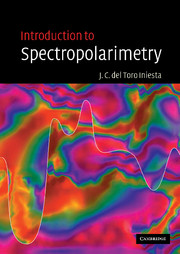Book contents
- Frontmatter
- Contents
- Preface
- Acknowledgements
- 1 Historical introduction
- 2 A review of some basic concepts
- 3 The polarization properties of quasi-monochromatic light
- 4 Linear optical systems acting on polarized light
- 5 Solar polarimetry
- 6 Absorption and dispersion
- 7 The radiative transfer equation
- 8 The RTE in the presence of a magnetic field
- 9 Solving the radiative transfer equation
- 10 Stokes spectrum diagnostics
- 11 Inversion of the RTE
- Index
Preface
Published online by Cambridge University Press: 11 August 2009
- Frontmatter
- Contents
- Preface
- Acknowledgements
- 1 Historical introduction
- 2 A review of some basic concepts
- 3 The polarization properties of quasi-monochromatic light
- 4 Linear optical systems acting on polarized light
- 5 Solar polarimetry
- 6 Absorption and dispersion
- 7 The radiative transfer equation
- 8 The RTE in the presence of a magnetic field
- 9 Solving the radiative transfer equation
- 10 Stokes spectrum diagnostics
- 11 Inversion of the RTE
- Index
Summary
For the object of the philosopher is not to complicate, but to simplify and analyze, so as to reduce phenomena to laws, which in their turn may be made the stepping-stones for ascending to a general theory which shall embrace them all; and when such a theory has been arrived at, and thoroughly verified, the task of deducing from it the results which ought to be observed under a combination of circumstances which has nothing to recommend it for consideration but its complexity, may well be abandoned for new and more fertile fields of research.
—G. G. Stokes, 1852.Were one asked for a concise description of most astrophysical tasks, one possible answer might be ‘understanding the message of light from heavenly bodies’. Light – or electromagnetic radiation – is the astronomer's main (almost his sole) source of information. The statement that nobody can measure the physical parameters of the solar atmosphere, although at first sight shocking, merely calls attention to the fact that astrophysics is an observational rather than an experimental science. This characteristic is often forgotten. We do not measure solar or stellar temperatures, velocities, magnetic fields, etc., simply because we do not have thermometers, tachometers, magnetometers, etc., that would permit in situ measurements of these parameters. Rather, we are only able to measure light. The astronomical parameters are inferred from these measurements, often with the help of some laboratory physics. Thus, the reliability of such astronomical inferences hinges on the accuracy of measurements of light.
Information
- Type
- Chapter
- Information
- Introduction to Spectropolarimetry , pp. xi - xivPublisher: Cambridge University PressPrint publication year: 2003
